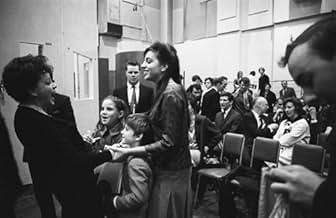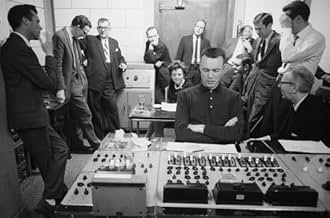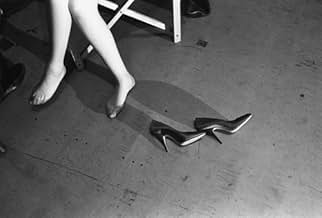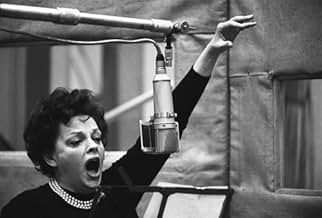Füge eine Handlung in deiner Sprache hinzuJenny Bowman is a successful singer who visits David Donne to see her son Matt again, spending a few glorious days with him while his father is away in Rome in an attempt to attain the famil... Alles lesenJenny Bowman is a successful singer who visits David Donne to see her son Matt again, spending a few glorious days with him while his father is away in Rome in an attempt to attain the family that she never had.Jenny Bowman is a successful singer who visits David Donne to see her son Matt again, spending a few glorious days with him while his father is away in Rome in an attempt to attain the family that she never had.
- Regie
- Drehbuch
- Hauptbesetzung
- Backstage Parent
- (Nicht genannt)
- …
- HMS Pinafore Audience
- (Nicht genannt)
- …
- Theatre Audience
- (Nicht genannt)
Empfohlene Bewertungen
Credit goes to a sincere, straightforward screenplay with some tart dialogue for Judy that sounds as if it came from her own true life experiences. Indeed, there are backstage stories that Judy and Dirk worked on the screenplay to tighten the emotional force of the drama and punch up the lines a bit--and if so, they have succeeded brilliantly.
Not only entertaining as a dramatic showcase for Miss Garland, it is also highly recommended for the musical interludes during which she performs at the London Palladium in great arrangements of material like "Hello, Bluebird!", "By Myself" and "I Could Go On Singing", among other melodies, all in full control of her "vibrato in search of a voice" equipment.
As a swansong for the actress, it is incredibly moving and a tribute to both Garland and Bogarde. Bogarde is especially intense in his emotional scenes--reminding me somewhat of the brooding character he played so well in LIBEL (a courtroom drama with Olivia de Havilland). He had become a mature actor by that time and here he is even more impressive.
Here, Garland plays Jenny Bowman, a famous performer who comes to London with a manager (Jack Klugman) and an assistant (Aline McMahon) to do concerts and goes to see an ex-beau, Dr. David Donne (Dirk Bogarde) with a faux medical problem. He knows she has an ulterior motive.
The two of them had broken up, but later, Jenny gave birth to their son. The newlywed David and his wife adopted the child because Jenny couldn't really handle carrying for a new baby and having a career. Matt never knew and believed that both David and his wife were his adopted parents.
Jenny claims that now that David's wife is dead, she just wants to see her son (Gregory Phillips). Once she sees him, she wants to spend time with him - it spirals out of control.
Despite its soapy plot, "I Could Go on Singing" manages to be very effective for two reasons: Judy Garland and Dirk Bogarde, both of whom lift this film up from the maudlin.
Bogarde is an uncredited writer on this film, contributing a lot of Garland's dialogue, as the script needed work before she could take the role; he often participated in screen writing on his films.
Garland plays her role as a brilliant talent who is a needy woman, but one who also is used to getting her way and knows what she wants. Despite an outer fragility, she knows how to stand up for herself.
As an entertainer, she is second to none - magical, warm, exciting, passionate, and fun. Garland sings the title song plus "By Myself," "It Never Was You", and "Hello, Blue Bird," all beautifully performed. Garland looks petite and wonderful as well.
During the scene in the hospital, in which David comes to see Jenny after she sprains her actor, the director, Ronald Neame, realized as the camera was rolling that the scene had passed out of the movie and into real life. Garland was no longer Jenny but Garland.
There was an incredibly intense atmosphere in the room, so instead of yelling cut, doing another take, and repositioning the camera, he let the scene go on. Normally a scene like that would take all day to film.
Bogarde realized that Neame wasn't going to stop and even altered his dialogue to respond to her. The result is an incredibly moving, very personal scene.
Bogarde gives a low-key performance and is perfect opposite Garland, very British, attempting to keep his emotions even -- a very generous actor who was also helpful to Neame in keeping Garland going.
There were a great many difficulties on the set, including an incident where a plate of food went flying through the air as Judy yelled at director Henry Hathaway. In the end, they all made it through, and the result is successful.
We have lots of examples on the screen and in recording of Judy Garland's tremendous talent and brilliance. "I Could Go On Singing" is a look at a character very close to Garland and gives a good sense of the real woman. Art imitates life, or did life imitate art - with Garland, one never knows.
Some twenty years before young medical student Dirk Bogarde, studying in America fell in love with singer Judy Garland just starting her career. That career is something she wanted more than him. But one thing couldn't be changed and that was the boy child Bogarde left with her.
Bogarde marries a girl from Great Britain and later on Judy who can't manage a baby and a career gives him up to Bogarde who adopts his own son with his wife and raises him. Now his wife is dead and Judy's back to lay a claim on her son played by Gregory Phillips.
Of course Bogarde has never told his son about his origin and therein lies the story. It's the kind of tale we've seen in hundreds of films and radio and television soap operas.
But of course what makes I Could Go On Singing special is the singing of Judy Garland. Giving this film which title could serve as her epitaph is Harold Arlen and E.Y. Harburg who wrote the title song and who wrote her famous Over The Rainbow.
Judy also sings By Myself which was sung and danced to by Fred Astaire in The Bandwagon. But a song I'm really glad she did was the Kurt Weill-Maxwell Anderson song It Never Was You. That song comes from the score of Knickerbocker Holiday and it didn't make the screen version. I'm glad that Judy Garland used it in this film, giving it the classiest interpretation possible.
A passable enough drama, but great singing and the best epitaph possible for a career which was one of the brightest.
Have always her an amazingly gifted singer with a beautiful voice and near-unsurpassable emotional connection to everything she sings and she to me was a good actress (especially in 'A Star is Born', 'The Wizard of Oz' and 'The Clock', though have really liked/loved her in everything seen of hers and have found a lot to admire for everything seen in films she stars or features in).
'I Could Go On Singing' is her last film and her swansong, and while Garland does not disappoint by any stretch of the imagination (she is the reason for seeing the film) she did deserve a better final film. 'I Could Go On Singing' is far from bad certainly and has a good deal to admire, but considering the potential and how great its strengths are it is a shame that it wasn't any better.
Due to Garland's illnesses, the film was finished in a hurry and it does show at times in some rushed-looking production values. Pacing is 'I Could Go On Singing's' biggest issue, with some all too obvious padding especially in the interminably self-indulgent "London travelogue" shots used to make up for when Garland was unavailable to film, those parts especially looked scrappy and should have been cut. The script is uneven, some of it genuinely moving and charming others (and too frequently) daft and melodramatically soapy, especially Dirk Bogarde's.
However, 'I Could Go On Singing' is mostly attractively photographed and the London Palladium stage gives an appealing sense of nostalgia. The music and songs are wonderful, especially the powerfully staged and performed "By Myself", the equally heartfelt "It Never Was You" and the rousing "Hello Bluebird".
In terms of standout scenes, the hospital waiting room scene, done in a single take, is particularly fine. It is a painfully honest and heart-breakingly honest scene and one of the greatest examples of improvisational acting on film personally seen, up there with the egg breaking scene in 1962's 'Cape Fear'. Ronald Neame directs admirably and there is enough that is powerful, entertaining and poignant.
Garland is the best asset other than the music, she is simply sensational and while it may not be her best performance it's to me one of them. She is especially good in the songs and in the hospital waiting room scene where the real her comes out in her character and it is startling in how real it feels and looks. Dirk Bogarde is very good as well, as are Jack Klugman, Aline McMahon and a sympathetic Gregory Phillips.
All in all, a good film with a significantly greater lead performance. 7/10 Bethany Cox
Wusstest du schon
- WissenswertesOfficially regarded as her final film before her death in 1969, Judy Garland filmed it immediately after making Ein Kind wartet (1963) though Bretter, die die Welt bedeuten (1963) was released first. At the time of filming, Garland was going through an ugly child custody battle of her own with her soon-to-be-divorced husband, Sidney Luft. The opportunity to make a film in England with Sir Dirk Bogarde, an actor and friend she had long admired, provided the perfect escape from her problems at home but unfortunately Garland carried her troubles with her across the Atlantic.
- Zitate
Jenny Bowman: You think you can make me sing? Do you think you can - do you think George can make me sing? or Ida? You can get me there, sure, but can you make me sing? I sing for myself. I sing when I want to, whenever I want to, just for me. I sing for my own pleasure. Whenever I want - do you under stand that?
- VerbindungenEdited into Chop Suey (2001)
Top-Auswahl
- How long is I Could Go on Singing?Powered by Alexa
Details
- Erscheinungsdatum
- Herkunftsländer
- Sprache
- Auch bekannt als
- I Could Go on Singing
- Drehorte
- Produktionsfirma
- Weitere beteiligte Unternehmen bei IMDbPro anzeigen
- Laufzeit1 Stunde 40 Minuten
- Farbe
- Seitenverhältnis
- 2.35 : 1





























